|
|
|
Sort Order |
|
|
|
Items / Page
|
|
|
|
|
|
|
| Srl | Item |
| 1 |
ID:
106645
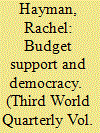

|
|
|
|
|
| Publication |
2011.
|
| Summary/Abstract |
Budget support-aid delivered directly to developing country government budgets-accounts for a growing proportion of overseas development assistance. In theory it has multiple benefits over other forms of aid in terms of attaining poverty reduction and development objectives. However, recent years have seen several incidents of budget support being frozen, halted or redirected because of slippage in the democratic credentials of certain countries, including Ethiopia, Uganda, Nicaragua, Honduras, Madagascar and Rwanda. This article analyses these incidents in relation to debates over aid conditionality. It finds that donors are willing to apply political conditionality when otherwise good performing governments go politically astray, but it questions whether budget support is a viable instrument for pushing for democratic change. Co-ordinated donor action appears to be increasing, but aid flows to the countries discussed remain high and the governments in question tend to be dismissive in the face of such pressure.
|
|
|
|
|
|
|
|
|
|
|
|
|
|
|
|
| 2 |
ID:
106650


|
|
|
|
|
| Publication |
2011.
|
| Summary/Abstract |
Drawing on the relevant literature, this article explores key debates and controversies on child labour in the context of Africa and Asia. It first identifies and analyses three dominant discourses on child labour: 1) the work-free childhoods perspective; 2) the socio-cultural perspective; and 3) the political economy perspective. Against the backdrop of these discourses, the article goes on to critically examine aspects of child labour that are underrepresented in the literature and in international policy circles. It concludes by highlighting the importance of grounding children's gendered work within the complex material social practices of interconnected histories and geographies in which their livelihoods unfold.
|
|
|
|
|
|
|
|
|
|
|
|
|
|
|
|
| 3 |
ID:
106643
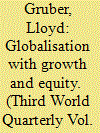

|
|
|
|
|
| Publication |
2011.
|
| Summary/Abstract |
As plentiful and productive as recent empirical work has been, we still know very little about globalisation's long-run impact on economic development. This is only partly because of data limitations. At least as important, this article suggests, have been theoretical limitations: economists and political scientists have yet to resolve a number of key conceptual points. This article brings these remaining theoretical puzzles to the surface, starting with the link between openness and growth. It then turns to the relationship between trade and inequality. Both links-the one from trade to growth, the other from trade to inequality-have been subjects of heated debate among development economists. By contrast, the main focus of this article is the relationship between these two strands of research. How growth and equity interact is a theoretical puzzle which, though no less basic than the others, has to date received far less attention. The article concludes by laying out a back-to-basics research agenda for future-oriented globalisation research in which this growth/equity trade-off is restored to its rightful place at the theoretical centre of the wider development literature.
|
|
|
|
|
|
|
|
|
|
|
|
|
|
|
|
| 4 |
ID:
106648
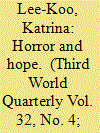

|
|
|
|
|
| Publication |
2011.
|
| Summary/Abstract |
This article examines the (re)presentations of militarised children in contemporary global politics. In particular, it looks at the iconic image of the 21st century's child soldier, the subject of which is constructed as a menacing yet pitiable product of the so-called new wars of the global South. Yet this familiar image is a small, one-dimensional and selective (re)presentation of the issues facing children who are associated with conflict and militarism. In this sense it is a problematic focal point for analysing the insecurity and human rights of children in and around conflict. Instead, this article argues that the image of the child soldier asserts an important influence in its effect upon global North-South relations. It demonstrates how the image of the child soldier can assist in constructing knowledge about the global South, and the global North's obligations to it, either through programmes of humanitarianism, or through war.
|
|
|
|
|
|
|
|
|
|
|
|
|
|
|
|
| 5 |
ID:
106644
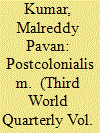

|
|
|
|
|
| Publication |
2011.
|
| Summary/Abstract |
This essay critically examines the nature and scope of postcolonial interdisciplinarity. Although postcolonial studies claims to operate on, and forge in, an interdisplinary approach, its intentions are largely interdiscursive. In spite of the vague and elusive claims evident in the catalogue of introductory texts on postcolonial theory, neither postcolonial theorists nor its exponents have adequately established the disciplinary bounds or their methodological fusion(s) specific to, and required for, interdisciplinarity. Drawing from the disciplinary foundations of literature, history and philosophy, this essay demonstrates that postcolonial theory has developed an implicit oppositional critique to eurocentrism. This oppositional critique, while discursive in intention and formulaic in application, is subsequently borrowed by a host of social science disciplines-anthropology, geography and development studies- as a proxy methodology that protects against the perils of eurocentric longings.
|
|
|
|
|
|
|
|
|
|
|
|
|
|
|
|
| 6 |
ID:
106641
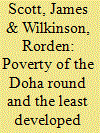

|
|
|
|
|
| Publication |
2011.
|
| Summary/Abstract |
Two distinct literatures have emerged on the World Trade Organization's Doha Development Agenda (DDA) and its likely benefits for developing countries. One is built on the use of computable general and partial equilibrium simulations, while another explores the political economy of the negotiation process to explore the opportunities a concluded round will bring for developing countries. Both literatures generate important insights into the DDA, and both highlight that the deal on offer to developing countries is very weak. However, there has been little engagement between these two bodies of thought. This paper seeks to begin to redress this, fusing a review of the simulations of likely DDA gains with an examination of the passage of the Doha negotiations. It argues that through this process we can arrive at a fuller understanding of how limited, and problematic, the results of the DDA are likely to be for the less developed countries. If the DDA is to deliver on its mandate, a qualitative shift in the negotiations is required.
|
|
|
|
|
|
|
|
|
|
|
|
|
|
|
|
| 7 |
ID:
106647
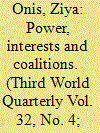

|
|
|
|
|
| Publication |
2011.
|
| Summary/Abstract |
Privatisation has been on the policy agenda in Turkey since the mid-1980s. Yet progress was slow throughout the first two decades of the Turkish neoliberal experiment. More recently, however, Turkey has experienced a major privatisation boom in the aftermath of the 2001 crisis. This paper tries to understand the nature of the recent privatisation boom from a political economy perspective and attempts to account for the paradox of the mass or hyper-privatisation experience of Turkey, comparable with Mexico and Argentina in the 1990s. A key concept here is the 'pro-privatization coalition'. An attempt is made to understand how this coalition is progressively strengthened while the power of the anti-privatisation coalition has been undermined in the post-2001 era. An interesting insight in this context concerns the importance of legal and institutional changes which also help to shift the balance from the anti- to the pro-privatization coalition. The final part of the paper aims to study the changing nature of resistance to privatisation by selective references to the opposition to some of the major privatisation deals in Turkey.
|
|
|
|
|
|
|
|
|
|
|
|
|
|
|
|
| 8 |
ID:
106646


|
|
|
|
|
| Publication |
2011.
|
| Summary/Abstract |
In this article we contrast the theoretical tradition of radical democracy developed by Chantal Mouffe with an alternative tradition of radical democracy rooted in the practices of subaltern social movements. While the former is wedded to the context and aspirations of Western modernity, the latter consists of place-based forms of 'colonial difference' within the Third and Fourth Worlds that are subalternised by the (aggressively globalising) modern tradition of democracy. Working within a 'modernity/coloniality' framework, we contrast these traditions of radical democracy along three main axes: 1) the logic of articulation among diverse struggles and movements; 2) the orientation towards, and aspirations with respect to, the state; and 3) the relation to the global scale and vision of the 'pluriverse'.
|
|
|
|
|
|
|
|
|
|
|
|
|
|
|
|
| 9 |
ID:
106649


|
|
|
|
|
| Publication |
2011.
|
| Summary/Abstract |
This article uses recent experience in Angola to demonstrate that young fighters were not adequately or effectively assisted after war ended in 2002. The government's framework excluded children from accessing formal disarmament, demobilisation and reintegration (DDR) programmes, and its subsequent attempts to target children have largely failed. More critically the case of Angola calls into question the broader effectiveness and appropriateness of child-centred DDR. First, such targeting is inappropriate to distinct post-conflict contexts and constructs a 'template child' asserted to be more vulnerable and deserving than adult ex-combatants, which does little to further the reintegration of either group, or the rights of the child in a conflict context. Second, child-centred reintegration efforts tend to deny children agency as actors in their own reintegration. Third, such efforts contribute to the normalisation of a much larger ideational and structural flaw of post-conflict peace building, wherein 'success' is construed as the reintegration of large numbers of beneficiaries back into the poverty and marginalisation that contributed to conflict in the first place.
|
|
|
|
|
|
|
|
|
|
|
|
|
|
|
|
|
|
|
|
|